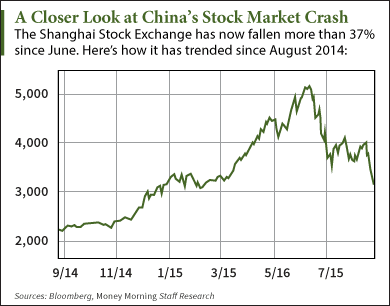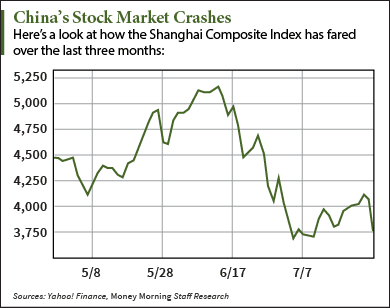How to profit from a stock market crash
Founded in by brothers Tom and David Gardner, The Motley Fool helps millions of people attain financial freedom through our website, podcasts, books, newspaper column, radio show, and premium investing services.

Wayne Silver , Flickr. One morning in late August, the Dow Jones Industrial Average plunged by about 1, points, horrifying many investors. Many panicked and gnashed their teeth and sold out of various companies. Others, though, smiled -- because a stock market crash can be a wonderful thing.
What's so good about the stock market plunging? Well, it present big bargains, offering lots of high-quality stocks or broad-market index funds at suddenly lower prices. It's a relatively common occurrence, too, so be prepared for many downturns during your investing life. Andrew Choy , Flickr.
Beware of emotions Unfortunately, many times our emotions get in the way when we're faced with financial decisions to make. When the stock market tanks, for example, lots of people succumb to fear and sell — which is precisely the wrong thing to do. It's fine to sell for good reasons, of course, such as if you have lost faith in a company's future potential or you have found a significantly more promising investment.
Even if we don't make the mistake of selling in a market downturn, many of us do still let fear overcome us, keeping us from buying. It can be hard to place an order to buy a stock when its price has fallen because so many people have sold it. Warren Buffett asks, are you a net buyer or seller of burgers? The proper perspective Superinvestor Warren Buffett offers a handy perspective with an edible analogy in his letter to shareholders:.
If you plan to eat hamburgers throughout your life and are not a cattle producer, should you wish for higher or lower prices for beef? Likewise, if you are going to buy a car from time to time but are not an auto manufacturer, should you prefer higher or lower car prices?
These questions, of course, answer themselves. But now for the final exam: If you expect to be a net saver during the next five years, should you hope for a higher or lower stock market during that period?
Many investors get this one wrong.
Even though they are going to be net buyers of stocks for many years to come, they are elated when stock prices rise and depressed when they fall.
In effect, they rejoice because prices have risen for the "hamburgers" they will soon be buying. This reaction makes no sense. Only those who will be sellers of equities in the near future should be happy at seeing stocks rise.
Error (Forbidden)
Prospective purchasers should much prefer sinking prices. Your time frame matters a lot here, as Buffett noted. If you're still in your adding-money-to-your-investments phase of your life, as most of us are for decades, then lower prices are a good thing. A market crash is bad news for some people, such as retirees who are living off of their investments -- but only if the money they will need within the next five or, to be more conservative, 10 years is in the stock market.
We're all advised to move such shorter-term money into more stable investments, such as CDs and money market accounts. Do so, and a market crash shouldn't derail your retirement. You'll have time to wait for a recovery.
The downturn can be short When the market crashes, or less extreme, undergoes a correction, it's best to act fast, because a recovery can sometimes happen quickly. My colleague Sean Williams has noted: In other words, stock market corrections often tend to be on the order of a few weeks to two quarters in length. In order to best position yourself to take advantage of a market drop, it's smart to not only keep some of your portfolio in cash, ready for compelling opportunities that arise, but also to maintain a watch list of stocks that interest you.
Your list can be a simple list, kept on a page of a notebook, or it can be even more useful than that. For example, maintain it as an online portfolio, so that you can see the price movements of the stocks over time. You might pretend that you bought a share of each on the day that you added it to the list. Do so, and after that, you can see at a glance how much it has risen or fallen since it joined the list.
When the market plunges, you'll be able to easily see which stocks have fallen the most. For an even more meaningful watch list, you can enter each holding at what you estimate its intrinsic value to be. So if you think Scruffy's Chicken Shack ticker: Then, every time you check the portfolio after that, you can immediately see how much above or below its intrinsic value the stock is trading for, helping you zero in on the most attractive opportunities.
Note that with this more labor-intensive approach, though, you'll have to keep up with the holdings and update your estimated values over time. The downturn can be long A market correction isn't always short, though. Think back to the decade from the end of to the end of , often referred to as "the lost decade. That might have you thinking that some market downturns are to be greatly feared. Again, this lull was painful for those who weren't net savers, but here's an interesting and often overlooked fact: Those who kept socking money away into the market during the lull eventually came out ahead.
Fidelity Investments, which manages the k accounts of millions of Americans, reported: The increase in balance was due to continued participant and employer contributions, dollar-cost averaging, and market returns. It's hard to go wrong if you keep adding to your long-term investments in the stock market -- especially during downturns.
The Motley Fool has no position in any of the stocks mentioned. Try any of our Foolish newsletter services free for 30 days.
We Fools may not all hold the same opinions, but we all believe that considering a diverse range of insights makes us better investors. The Motley Fool has a disclosure policy.
Selena Maranjian has been writing for the Fool since and covers basic investing and personal finance topics. For more financial and non-financial fare as well as silly things , follow her on Twitter Skip to main content The Motley Fool Fool.
How to Profit from a Stock Market Crash
Premium Advice Help Fool Answers Contact Us Login. Latest Stock Picks Stocks Premium Services. Stock Advisor Flagship service. Rule Breakers High-growth stocks. Income Investor Dividend stocks. Hidden Gems Small-cap stocks. Inside Value Undervalued stocks. Learn How to Invest.
Credit Cards Best Credit Cards of Best Credit Card Sign-Up Bonuses Best Balance-Transfer Credit Cards Best Travel Credit Cards Best Cash-Back Credit Cards Best No-Annual-Fee Credit Cards Best Small Business Credit Cards.

Mortgages Compare Mortgage Rates Get Pre-Approved How Much House Can I Afford? Taxes How to Reduce Your Taxes Deductions Even Pros Overlook Audit-Proof Your Tax Return What Info Should I Keep?
Helping the World Invest — Better. How to Invest Learn How to Invest. Personal Finance Credit Cards Best Credit Cards of Best Credit Card Sign-Up Bonuses Best Balance-Transfer Credit Cards Best Travel Credit Cards Best Cash-Back Credit Cards Best No-Annual-Fee Credit Cards Best Small Business Credit Cards.
Aug 29, at